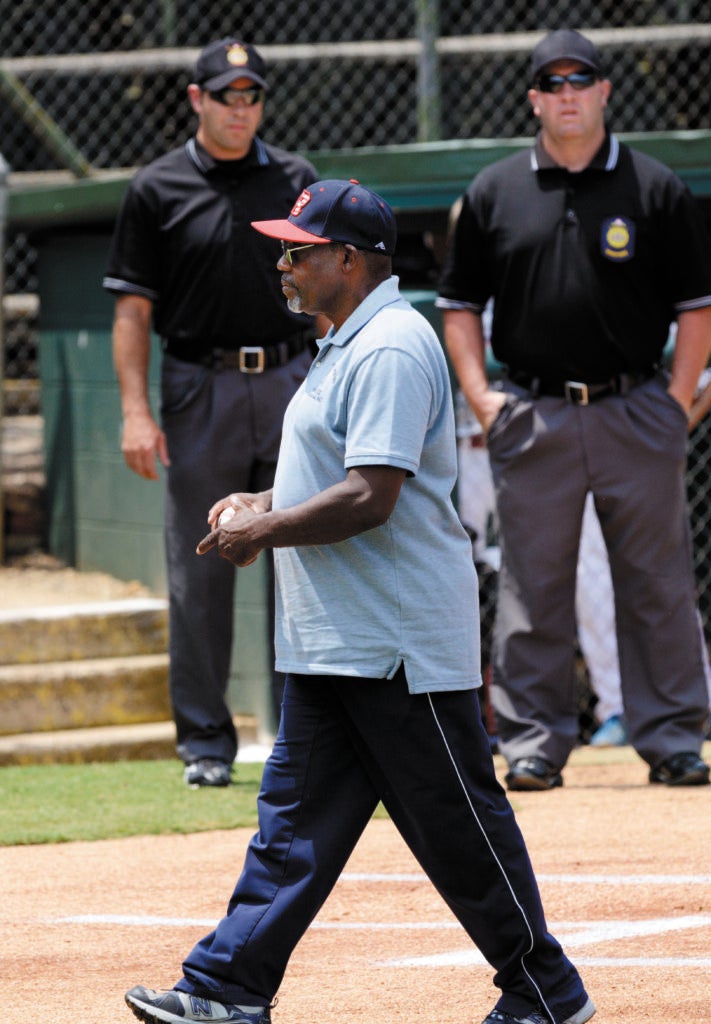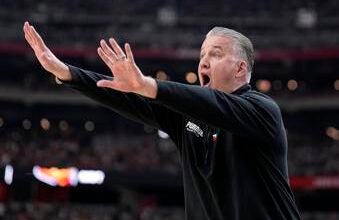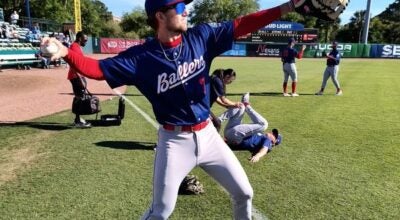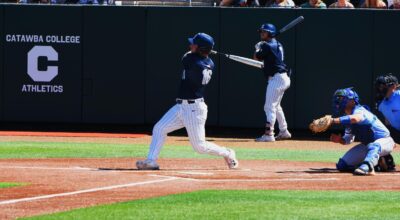Baseball: Salisbury resident Gillispie inducted into Gaston Hall of Fame
Published 4:54 pm Monday, April 8, 2024

- NC American Leigon Hall of Famer Willie Gillispie at Newman Park for ceremonial first pitch in 2020. photo by Wayne Hinshaw, for the Salisbury Post
By Richard Walker
Carolina Sports HUB
When long-time Salisbury resident Willie Gillispie grew up in Gaston County in the 1950s and 1960s, he developed a love affair with baseball.
The sport helped create opportunities folks of Gillispie‘s era couldn’t have imagined in his childhood – and it’s now led into induction in two halls of fame.
A 2015 inductee into the North Carolina American Legion Hall of Fame, Gillispie was part of the 2024 Gaston County Sports Hall of Fame class inducted at the Gastonia Conference Center on Monday.
“It’s going to be a great honor for me,” Gillispie said. “I will say this: There’s a lot of people that deserve to be in the Gaston County Sports Hall of Fame. What I accomplished in Gaston County is very important to me because I love Gaston County — and I had a lot of help.”
Gillispie was a racial pioneer for teams and for a former Gaston County high school in the 1960s where his success helped eased many of the tensions that existed during his athletic career.
Gillispie and another African-American classmate from Gastonia’s old Highland High School, Elmore Hill, were asked to do something even they were unaware of at the time when they were invited to play for Gastonia American Legion Post 23’s baseball team in 1964.
“It was hard,” Gillispie said. “I’m not going to sit here and say it wasn’t hard.”
But Gillispie overcame racial slurs, perceived slights and a climate where many were unhappy with he and Hill being on the field as the first African-American baseball players in the state of North Carolina.
Perhaps an early adversity Gillispie faced that later turned into his “Jet” nickname is an indication of how Gillispie turned doubters into believers with his ability on the field.
Early in the 1964 season, Gillispie was on first base and given a steal sign just before a batter singled to right field. Since Gillispie was schooled in aggressive baseball, he figured he would be at third base in moments when Post 23 assistant coach and third base coach Don Saine held him up.
“When I got past second, coach Saine held me up,” Gillispie said. “So when I tried to get back, I got tagged out. And when I got to the bench, he chewed me out. I said, ‘Coach, no disrespect, but if you’re stealing me and there’s a base hit to right field, don’t hold me up because I’m going to be on third base.’
“After that, they never held me up.”
To make light of the situation, a Post 23 teammate came up with a name that has stuck with him ever since.
“Bill Grant started calling me ‘Jet’ after the happened,” Gillispie said. “They were teasing me about getting tagged out but after that, I think I stole about 18 straight bases. And the name stuck.”
Saine, a 2007 GCSHOF inductee, became so fond of Gillispie that within a year, he coached the speedy running back on his football team at old Dallas High – or when Gillispie and two other African-American players broke the color line at that school in the fall of 1965.
Gillispie later became a member of the first Gaston College baseball team in 1968 while playing for the same head coach he had in 1964 playing for the Post 23 team.
Amazingly, Gillispie was only 15 years old when he played for Post 23 in the summer of 1964.
And while Jackie Robinson had broken the color line in major league baseball 17 years earlier, the Civil Rights Act that prompted change in states like North Carolina wasn’t ratified until five weeks into their historic season.
Also, even as the Supreme Court’s precedent-setting Brown vs. Board of Education ruling was 10 years earlier, Gaston County was two years away from fully integrating its schools.
As he looks back now, Gillispie says his youthfulness meant he needed help to navigate the challenges he faced that summer.
And he credits Hill, a 2010 GCSHOF inductee who was two years older than him, with being a mentor.
“My good fortune was having a big brother on that team in Elmore Hill,” Gillispie said. “He was always calm no matter what happened and I was a hot head. So I had him to kind of calm me down when things were tough.
“I remember when we playing a game at the old Fairgrounds in Hickory. And this bunch of kids sitting on the brick wall were throwing pebbles at me and hitting me on the back of the legs. I think he was playing center and I was in right or left field.
“I said, ‘Moe, what we’re going to do?’ He said, ‘Jet, just play ball!’
“So it was hard and it was different. But I had a lot of support from my teammates and then I had my big brother Moe to keep me calmed down.”
Gillispie added that he began understanding that some of the struggles he and Hill were enduring were also being leveled at his teammates.
“I started realizing that it not only was a big adjustment for me and Moe but it was a big adjustment for the guys we played with. So I kinda calmed down after the first year.
“I played three years for Post 23 and my teammates were great. I wouldn’t change anything that ever happened because it was a great experience and I gained lifelong friends from it.”
Gillispie, a graduate of Gaston College’s nursing school, has lived in Salisbury for decades and retired in 2012 from that city’s Veterans Administration Hospital.
He credits his uncle, Eddie Bratton of Dallas, for giving him his love of baseball by taking him to games, teaching him how to play and later letting him play on his teams in the early 1960s.
“I was playing that aggressive style of baseball with men when I was 14,” Gillispie said.
Gillispie attended three high schools, Bessemer City’s Lincoln High, Gastonia’s Highland High and, finally, Dallas High where he graduated in 1966.
He also continued to shine for Post 23 as the team won the Area IV title all three years Gillispie was on the team, even as they lost to powerful opponents each year in the Western finals – to eventual American Legion World Series runner-up Charlotte Post 9 in 1964, to eventual ALWS champion Charlotte Post 9 in 1965 and to eventual N.C. runner-up Greensboro Cone in 1966. Gillispie led Gastonia in 1966 with a .419 batting average.
After one year playing football and baseball at Shaw University in Raleigh, Gillispie returned to Gastonia, enlisted in the military as a medic and played one season for Gaston College’s inaugural baseball team for Hugh “Buzz” Peeler. Peeler, a Cherryville American Legion Post 100 star in 1953 who later played at Lenoir-Rhyne and professionally, was the coach of the 1964 Post 23 team.
Following that season, Gillispie was stationed at a military hospital in Illinois and his sargeant gave him permission to play in an independent baseball league in that state.
A lefty hitter, Gillispie dominated the Eastern League by winning three batting titles in his four seasons in the league. In 2010, a book written about the history of the Eastern League named Gillispie the sixth-best player in its 75-year history.
But Gillispie longed for home and returned to Gastonia where he raised his family and played and coached semipro baseball.
“I’ve got a lot of kids,” said Gillespie, who married Edna Thorpe Gillispie when he was stationed in Illinois. “I’ve got three boys and three girls. And when I got remarried, she had three boys. I have a wonderful wife and she was also a nurse.”
In recent years, Gillispie has had open heart surgery in 2007, total hip replacement in 2012 and more leg surgery to deal with circulation issues.
“But I’m still enjoying life, my family and baseball,” Gillispie said.





